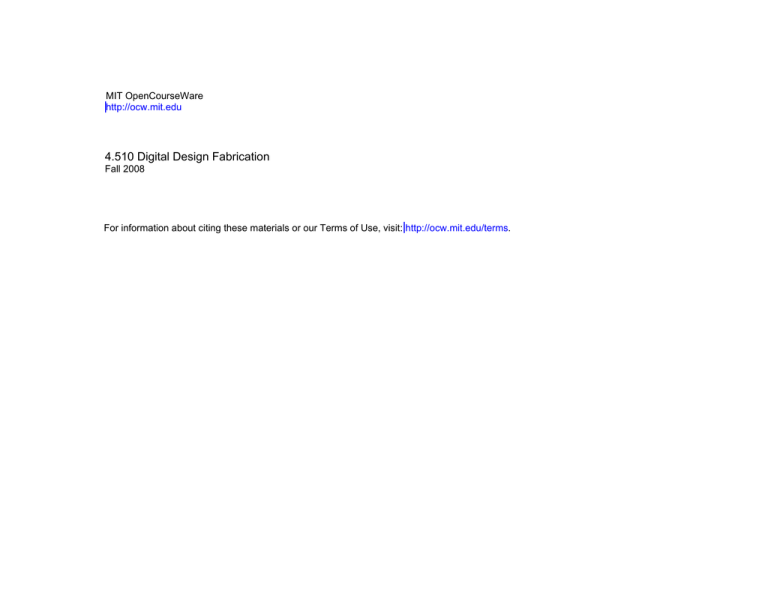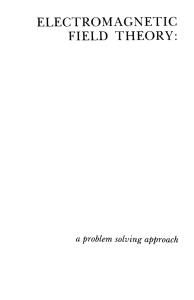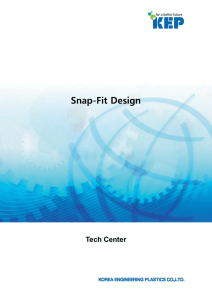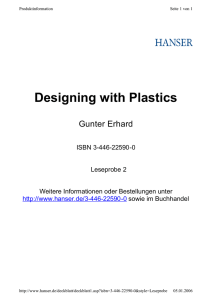4.510 Digital Design Fabrication MIT OpenCourseWare rms of Use, visit: .
advertisement

MIT OpenCourseWare http://ocw.mit.edu 4.510 Digital Design Fabrication Fall 2008 For information about citing these materials or our Terms of Use, visit: http://ocw.mit.edu/terms. Error in fabrication Continuous Glass Surface Quarter Scale Construction Problems 1. Poor relationship between tools 2. Design is a rain-screen 3. Inconsistent connections at joints from error in measuring, cutting and assembly Error in fabrication Research Questions Can curved surfaces be modeled in a design office? Is it possible to construct buildings with smooth continuous transparent structures? Can the surface be waterproof Assembly Design Assembly design accompanies material, machine and cost selections Sequence of assembly should be a major criteria in assembly design Assembly design is an iterative process as much as it is a destiny - The first model is only the beginning of the process. Design Factors (Geometry) 1. Part Function - Goal 2. Materials 3. Assembly structure 4. Machining 5. Tolerance between parts Designing Assemblies Andreasen, Kahler and Lund No assemblies Making a Zipper Assembly Three different production methods for zip fasteners. Integration Figure by MIT OpenCourseWare. Geoffrey Boothroyd Automated Designing Assemblies 48 mm Figure by MIT OpenCourseWare. 48 mm Factors in Automated Assembly • Automate assembly process using machines that assemble parts on a line 1 0.9 Assembly cost ($) 0.8 Annual Production Volumes: 0.7 • Increase productivity and reduce cost Robotic - 200,000 Automatic - 2,400,000 0.6 0.5 0.4 • Build a more consistent product with higher reliability 0.3 0.2 Robot Automatic Manual 0.1 0 24 8 4 2 Number of parts Figure by MIT OpenCourseWare. Designing Assemblies (Redford, A, et al 1984). • The process should always include methods to improve design of assembly • The design should be systematic • The assembly process should be measurable Functions (DFA) Contains two or more joints a) An assembly of parts contains a start base b) The start base or part should contain spring angles c) The assembly angle should be assured during manufacturing Assembly Types Integral Attachments a) Term was developed by the plastics industries in the mid 1990’s b) Flexibility in design c) Measurable (Computable) “A snap-fit is a mechanical joint system where part-to-part attachment is accomplished with locating and locking features (constraint features) that are homogenous with one or the other of the components being joined.” -The First Snap-Fit Handbook, Bonenberger, 2000 Snap fit • Important Criterion – Flexibility in integral locking feature “Catch” • Joining method using springy (elastic) properties of metals and plastics – Plastic – Plastic – Plastic – Metal – Metal – Metal • Although most commonly used today with plastic assembled parts, snap-fit has long before existed in metal-metal components in clothing • Results in reduced man-hour, production cost, and or number of parts in assembly Snap fit examples • Toys • Small Appliances • Automotive • Electronic Fields L Y Cantilever "U" Shaped Cantilever "L" Shaped Cantilever Figure by MIT OpenCourseWare. K’nex Example: Duracon M90-44 Yield strain : 7 - 8% Thickness: h = 3mm Height: Y = 2mm Straight beam L ho Y (Max deflection) Dynamic strain 3Yho ε= 2L2 Figure by MIT OpenCourseWare. Span: L = 10mm Strain = 9% "H" Molding Fascia/Soffit "Z" Outside corner "J" Molding Reveal "H" Drip edge or inside corner Figure by MIT OpenCourseWare.





